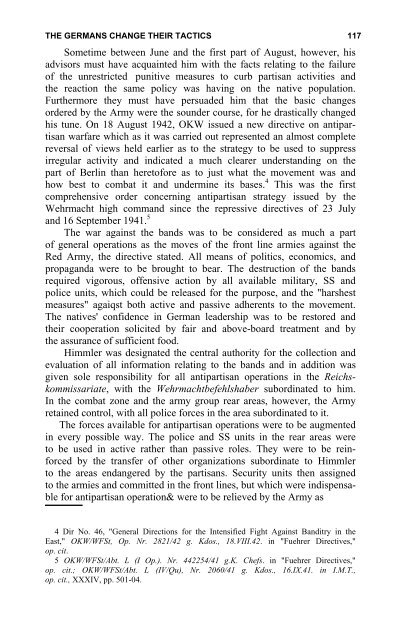the soviet partisan movement 1941-1944 by edgar m. howell
the soviet partisan movement 1941-1944 by edgar m. howell
the soviet partisan movement 1941-1944 by edgar m. howell
Create successful ePaper yourself
Turn your PDF publications into a flip-book with our unique Google optimized e-Paper software.
THE GERMANS CHANGE THEIR TACTICS 117<br />
Sometime between June and <strong>the</strong> first part of August, however, his<br />
advisors must have acquainted him with <strong>the</strong> facts relating to <strong>the</strong> failure<br />
of <strong>the</strong> unrestricted punitive measures to curb <strong>partisan</strong> activities and<br />
<strong>the</strong> reaction <strong>the</strong> same policy was having on <strong>the</strong> native population.<br />
Fur<strong>the</strong>rmore <strong>the</strong>y must have persuaded him that <strong>the</strong> basic changes<br />
ordered <strong>by</strong> <strong>the</strong> Army were <strong>the</strong> sounder course, for he drastically changed<br />
his tune. On 18 August 1942, OKW issued a new directive on anti<strong>partisan</strong><br />
warfare which as it was carried out represented an almost complete<br />
reversal of views held earlier as to <strong>the</strong> strategy to be used to suppress<br />
irregular activity and indicated a much clearer understanding on <strong>the</strong><br />
part of Berlin than heretofore as to just what <strong>the</strong> <strong>movement</strong> was and<br />
how best to combat it and undermine its bases. 4 This was <strong>the</strong> first<br />
comprehensive order concerning anti<strong>partisan</strong> strategy issued <strong>by</strong> <strong>the</strong><br />
Wehrmacht high command since <strong>the</strong> repressive directives of 23 July<br />
and 16 September <strong>1941</strong>. 5<br />
The war against <strong>the</strong> bands was to be considered as much a part<br />
of general operations as <strong>the</strong> moves of <strong>the</strong> front line armies against <strong>the</strong><br />
Red Army, <strong>the</strong> directive stated. All means of politics, economics, and<br />
propaganda were to be brought to bear. The destruction of <strong>the</strong> bands<br />
required vigorous, offensive action <strong>by</strong> all available military, SS and<br />
police units, which could be released for <strong>the</strong> purpose, and <strong>the</strong> "harshest<br />
measures" agaiqst both active and passive adherents to <strong>the</strong> <strong>movement</strong>.<br />
The natives' confidence in German leadership was to be restored and<br />
<strong>the</strong>ir cooperation solicited <strong>by</strong> fair and above-board treatment and <strong>by</strong><br />
<strong>the</strong> assurance of sufficient food.<br />
Himmler was designated <strong>the</strong> central authority for <strong>the</strong> collection and<br />
evaluation of all information relating to <strong>the</strong> bands and in addition was<br />
given sole responsibility for all anti<strong>partisan</strong> operations in <strong>the</strong> Reichskommissariate,<br />
with <strong>the</strong> Wehrmachtbefehlshaber subordinated to him.<br />
In <strong>the</strong> combat zone and <strong>the</strong> army group rear areas, however, <strong>the</strong> Army<br />
retained control, with all police forces in <strong>the</strong> area subordinated to it.<br />
The forces available for anti<strong>partisan</strong> operations were to be augmented<br />
in every possible way. The police and SS units in <strong>the</strong> rear areas were<br />
to be used in active ra<strong>the</strong>r than passive roles. They were to be reinforced<br />
<strong>by</strong> <strong>the</strong> transfer of o<strong>the</strong>r organizations subordinate to Himmler<br />
to <strong>the</strong> areas endangered <strong>by</strong> <strong>the</strong> <strong>partisan</strong>s. Security units <strong>the</strong>n assigned<br />
to <strong>the</strong> armies and committed in <strong>the</strong> front lines, but which were indispensable<br />
for anti<strong>partisan</strong> operation& were to be relieved <strong>by</strong> <strong>the</strong> Army as<br />
4 Dir No. 46, "General Directions for <strong>the</strong> Intensified Fight Against Banditry in <strong>the</strong><br />
East," OKW/WFSt, Op. Nr. 2821/42 g. Kdos., 18.VIII.42. in "Fuehrer Directives,"<br />
op. cit.<br />
5 OKW/WFSt/Abt. L (I Op.). Nr. 442254/41 g.K. Chefs. in "Fuehrer Directives,"<br />
op. cit.; OKW/WFSt/Abt. L (IV/Qu), Nr. 2060/41 g. Kdos., 16.IX.41. in I.M.T.,<br />
op. cit., XXXIV, pp. 501-04.
















